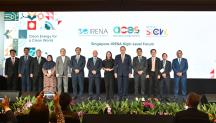

Accelerating Renewables Is our Most Effective Climate Solution
Newsletter
With the UN Climate Conference in Katowice (COP24) only weeks away, the Intergovernmental Panel on Climate Change (IPCC) has released the much-awaited Special Report on Global Warming of 1.5 °C. In its assessment of 1.5 °C pathway scenarios, the IPCC highlights the need for a rapid energy transition based on a significant increase of renewables particularly in end-use sectors. Commenting on this, Adnan Z. Amin, Director-General of the International Renewable Energy Agency (IRENA) today welcomed the report’s focus on the critical role of renewable energy in tackling climate change and urged the global community to accelerate its deployment.
No climate solution without renewables
“The IPCC report sends a clear signal and calls for a large-scale transformation of the global energy system. A decarbonised energy system, increasingly fueled by renewable sources, is vital to the global response to the threat of climate change”, Adnan Z. Amin said. “IRENA’s analysis shows that renewable energy and energy efficiency represent the most cost-effective pathway for achieving 90 per cent of the energy-related CO2 emission reductions needed to meet the ‘well below 2 degrees objective’ of the Paris Agreement”.
“The world of energy is witnessing rapid and disruptive changes. Renewables already account for around a quarter of global electricity generation. In the last six years, renewable power capacity additions outpaced additions from fossil fuels and nuclear power combined. However, if we are to meet our climate goals, renewables deployment must accelerate six times faster than today.”
Countries leave potential of renewables untapped
“Renewable energy allows governments to opt for significantly higher ambition levels in their climate plans, including their Nationally Determined Contributions (NDCs) under the Paris Agreement”, Adnan Z. Amin added. “Thanks to dramatic cost reductions and technology improvements, renewables are technically feasible and economically attractive. This is for instance also increasingly manifested in the energy choices of private actors. IRENA estimates that, through corporate sourcing of renewables alone, companies have already created demand the size of the electricity market of France.”
“A sustainable energy transformation will not only contribute to climate objectives. IRENA’s Roadmap to 2050 shows it will support positive social and economic outcomes, lifting millions out of energy poverty, increasing energy independence and stimulating sustainable economic growth and job creation. To fully reap the benefits of the energy transformation, we have to make sure that its welfare gains and costs are fairly distributed. We have opportunities at hand that we must rally behind by adopting strong policies, mobilising capital and driving innovation across the energy system.”, concluded Adnan Z. Amin.
IRENA’s Global Energy Transformation: A Roadmap to 2050 finds that the shift to renewable energy and energy efficiency could generate global gains of up to USD 6 trillion annually by 2050. The global economy would grow by one per cent – leading to a cumulative gain of up to USD 52 trillion by 2050. Global welfare such as health benefits from reduced air pollution and reduced climate impacts would improve by 15 per cent. This massive transformation would generate a net gain of over 11 million additional jobs in the energy sector by 2050. However, this shift requires new approaches to planning, system and market operations, regulation and public policy. As countries are working towards transitioning to a sustainable energy future, IRENA is actively supporting their efforts by providing policy, technology, and financial knowledge on renewable energy and strengthening international cooperation through the exchange of experiences and best practices.
Read more:
Renewable Energy Benefits: Measuring the economics
Untapped potential for climate action: Renewable energy in Nationally Determined Contributions




